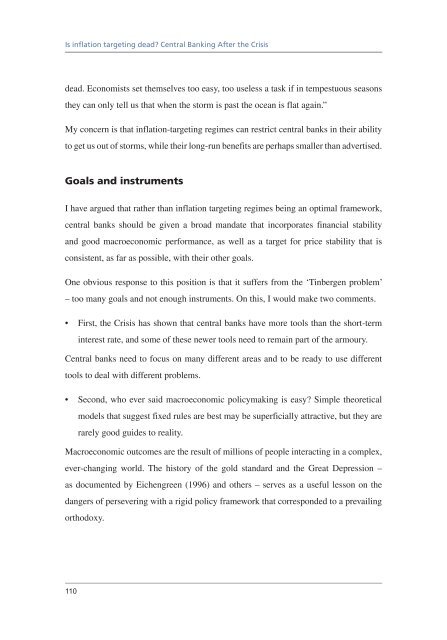Is inflation targeting dead? Central Banking After the Crisis - Vox
Is inflation targeting dead? Central Banking After the Crisis - Vox
Is inflation targeting dead? Central Banking After the Crisis - Vox
You also want an ePaper? Increase the reach of your titles
YUMPU automatically turns print PDFs into web optimized ePapers that Google loves.
<strong>Is</strong> <strong>inflation</strong> <strong>targeting</strong> <strong>dead</strong>? <strong>Central</strong> <strong>Banking</strong> <strong>After</strong> <strong>the</strong> <strong>Crisis</strong><strong>dead</strong>. Economists set <strong>the</strong>mselves too easy, too useless a task if in tempestuous seasons<strong>the</strong>y can only tell us that when <strong>the</strong> storm is past <strong>the</strong> ocean is flat again.”My concern is that <strong>inflation</strong>-<strong>targeting</strong> regimes can restrict central banks in <strong>the</strong>ir abilityto get us out of storms, while <strong>the</strong>ir long-run benefits are perhaps smaller than advertised.Goals and instrumentsI have argued that ra<strong>the</strong>r than <strong>inflation</strong> <strong>targeting</strong> regimes being an optimal framework,central banks should be given a broad mandate that incorporates financial stabilityand good macroeconomic performance, as well as a target for price stability that isconsistent, as far as possible, with <strong>the</strong>ir o<strong>the</strong>r goals.One obvious response to this position is that it suffers from <strong>the</strong> ‘Tinbergen problem’– too many goals and not enough instruments. On this, I would make two comments.• First, <strong>the</strong> <strong>Crisis</strong> has shown that central banks have more tools than <strong>the</strong> short-terminterest rate, and some of <strong>the</strong>se newer tools need to remain part of <strong>the</strong> armoury.<strong>Central</strong> banks need to focus on many different areas and to be ready to use differenttools to deal with different problems.• Second, who ever said macroeconomic policymaking is easy? Simple <strong>the</strong>oreticalmodels that suggest fixed rules are best may be superficially attractive, but <strong>the</strong>y arerarely good guides to reality.Macroeconomic outcomes are <strong>the</strong> result of millions of people interacting in a complex,ever-changing world. The history of <strong>the</strong> gold standard and <strong>the</strong> Great Depression –as documented by Eichengreen (1996) and o<strong>the</strong>rs – serves as a useful lesson on <strong>the</strong>dangers of persevering with a rigid policy framework that corresponded to a prevailingorthodoxy.110














